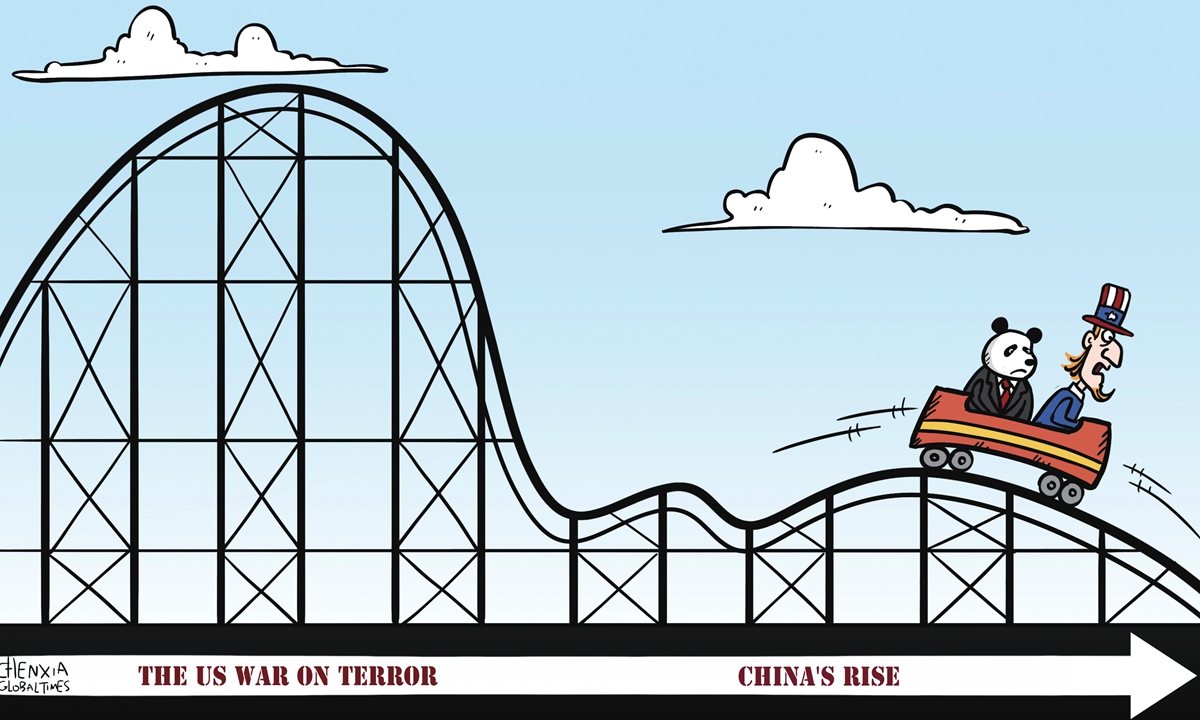
China-US ties Illustration: Chen Xia/GT
On Monday, Colin Powell, the first black US secretary of state, died from complications from COVID-19 at age 84.
Powell served as secretary of state in the George W. Bush administration from January 2001 to May 2005. At that time, China-US relations were moving forward steadily. In the context of the 9/11 attacks and US' War on Terror, Powell claimed in 2004 that the US relationship with China was the "best" in more than 30 years.
When reviewing Powell's life, many media mentioned his role in the US-launched Iraq War. In particular, during a presentation to the UN Security Council in February 2003, he provided fake evidence that Iraq possessed weapons of mass destruction to try to persuade the council to pass a resolution backing war against Iraq. Two years later, he said in an interview that that was a "blot" on his record, and "painful" for him.
In terms of diplomatic style, Powell was a dovish figure who advocated multilateral diplomacy. However, it is reported that he suggested placing the war against Iraq in the discussion under the framework of the UN Security Council. He was restricted by the hawks led by then-secretary of defense Donald Rumsfeld, who emphasized unilateralism and military solutions to foreign relations. As a result, he resigned from his post as secretary of state.
Powell played a significant role in the China-US relations after the 9/11 attacks. Yet this is primarily because the US ramped up cooperation with major powers including China out of the demand on counterterrorism. This has given Powell more room to develop US' foreign policy.
In the end, the Bush administration returned to the track of pursuing unilateralism. This was directly related to US' instinct to assert its hegemonic position. In the logic of hegemonic muscle moves, there is no distinction between doves and hawks.
Powell visited China three times during his office term. China "is a nation that need not be seen as an enemy," he said when visiting China in July 2001. When interviewed by Hong Kong-based Phoenix Television in Beijing in 2004, Powell said, "There is only one China. Taiwan is not independent. It does not enjoy sovereignty as a nation, and that remains our policy, our firm policy."
The above-mentioned narratives were seen as a strategic adjustment of the US toward China. In fact, the US' adjustment at that time did not mean that the strategic framework of its relations with China had changed.
On September 9, 2004, it was 10 days before the countdown clock for the 2008 Beijing Olympic Games was turned on in Tiananmen Square.
On the same day in Washington DC, the US Senate Foreign Relations Committee held a testimony on the crisis in Darfur, Sudan. During the testimony, Powell first used the word "genocide." At that time, Chinese oil companies had already entered Sudan.
Genocide means the intentional action to destroy a people. Later facts have shown that what happened in Darfur was not genocide at all. Western media sensationalized that more than 1 million people died there. But there lacked solid evidence.
Following US government's definition, some NGOs in the US linked the Beijing Olympic Games with Darfur and called it the "Genocide Olympics." They even printed such logos on T-shirts and distributed them everywhere.
In March 2008, the New York Times Magazine asked one of the activists, "Why single out Darfur and why target China?" The answer was, "This is the first genocide, since the word was coined, where it was defined as genocide by the American government while it has been happening."
When we review US' China-related policies that Powell participated in, we could in general find what has determined the direction of China-US relations. These are the structural contradictions that scholars often discuss about. They refer to the contradictions determined by competition between two different systems, civilizations, as well as the established and emerging powers.
Such contradictions have been existing in bilateral relations. But they temporarily flew low after the anti-terror war became US' top priority following the 9/11 attacks. The contradictions have gradually become prominent since the Beijing Olympic Games flame was extinguished. This has come in the context of China's rising into the world's second-biggest economy. It has become a challenge to US hegemony in many aspects with increasingly obvious political advantages. The crux of China-US relations in future is the same, as I have argued in many of my articles, on this question: How to get out of, or even break the framework of structural contradictions?
The author is a senior editor with People's Daily, and currently a senior fellow with the Chongyang Institute for Financial Studies at Renmin University of China. dinggang@globaltimes.com.cn. Follow him on Twitter @dinggangchina


